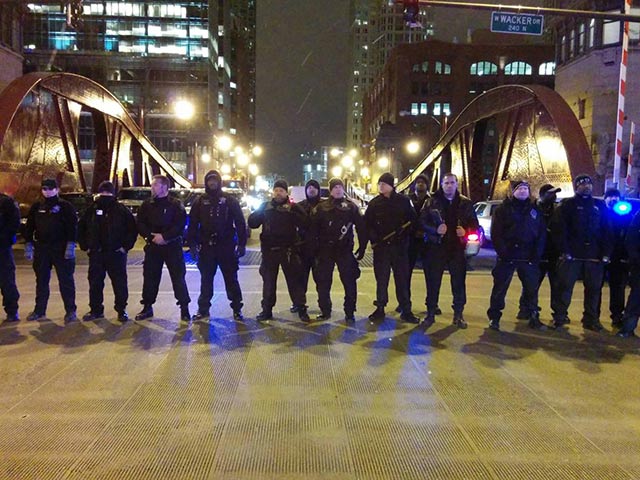
One of the common refrains that Indigenous people in the United States are confronted with when they speak to this country’s history of genocide and repression is the claim that the harms Natives have historically endured are confined to the past. We are told that we are no longer living out the reality or the legacy of losing 100 million of our people in much the same way that Black Americans are told that they are no longer suffering the aftereffects of slavery. The social demand that oppressed peoples behave as though they are no longer experiencing the consequences of colonialism, mass kidnappings, dehumanization and genocide would be absurd enough on its face, given that the violence inflicted upon Brown and Black bodies has only been refashioned with time. But the popular consciousness of the United States actually takes its self-absolving delusions several steps beyond the illusion of distance.
Like most societies, the US is grounded in a set of prescribed values and ideas. Land was “settled,” rather than stolen. Settlers broke bread with Natives on “Thanksgiving” as an expression of fellowship and unity, as opposed to slaughtering them at will. The institutions that police our communities were built to serve and protect the public, rather than having evolved from enforcers of slavery, displacement and genocide.
The myth of Thanksgiving has a great deal in common with the false image of policing in the United States. Just as Thanksgiving whitewashes a period soaked in the blood of Natives slaughtered during crimes of conquest, the myth of police as guardians of the public whitewashes the reality of where those institutions began.
Slave patrols and “Indian constables” were created in the United States to enforce a social and economic order, and today’s police serve the same purpose. Any amount of attention paid to the endless stream of imagery and accounts of Black and Brown people being harmed by police could easily clarify for the observer that policing in the United States is not grounded in law.
American policing is, as it always has been, grounded in the maintenance of social norms, which include a whole spectrum of oppressions, and the illusion that the state both cares for and protects its people.
The myth of Thanksgiving creates a cheery, almost cartoon-like narrative of a incredibly dark and bloody period of American history. And much like the realities of policing, the realities of this history could not be more accessible. Native genocide is not unknown to most Americans, and yet the myth of Thanksgiving is imparted to children as an inspiring representation of their country’s values. Native suffering is erased with holiday platitudes. In classrooms, the ugliness of colonial history is dismissed in favor of happier sights, like the paper turkeys, cut from construction paper by children, some of whom are consuming lies that obscure their own journey through their people’s oppression.
Our loss is buried in storybook history, gluttonous meals and holiday shopping deals.
These myths must be dismantled. It is a matter of defending the truth of our history, and the truth of our lives. Black and Brown people in the United States must demand an honest understanding and acknowledgment of history from all who would stand with them, and we must understand the connectivity of our past and present traumas. As police continue to kill both our peoples at startling rates, we must attack the myths of both the present and the past, because they are indivisible. The lies of this culture are the social absolution, for crimes past and present, indulged by those who would rather not own up to their privilege and complicity.
To create a future that embraces a new narrative, we must destroy those means of absolution – both old and ongoing.
Like most mythologies, these historical and ideological constructions will always have their adherents. People cling to the myths that prop up their sense of the world and their place in it, and undermining those myths can be a costly, and at times, deadly business. But to pull forward those who are capable of knowing and doing better, and to curb the internalized oppressions of our own people, marginalized people must connect the dots of history. The forces that perpetuate Black and Brown death must be understood as informing the past, the present and a wholly preventable future.
In a society grounded in the exploitation and annihilation of Black and Brown bodies, telling our story is a matter of cultural self-defense.
Social cycles cannot be broken when they aren’t so much as acknowledged, and justice cannot be conceived of in communities that are grounded in the lies of the oppressor. One page follows another, and the truth of the present cannot be understood without an honest retelling of the past.
It’s time to gut the storybooks and write the truth on every wall. So, this Thanksgiving, feel free tear down the paper turkeys and modern myths of white supremacy with abandon and without apology.
As the shopping commercials say, tis’ the season.
This piece was written by Indigenous activist and writer Kelly Hayes, one of the co-founders of Lifted Voices.
Join us in defending the truth before it’s too late
The future of independent journalism is uncertain, and the consequences of losing it are too grave to ignore. We have hours left to raise the $12,0000 still needed to ensure Truthout remains safe, strong, and free. Every dollar raised goes directly toward the costs of producing news you can trust.
Please give what you can — because by supporting us with a tax-deductible donation, you’re not just preserving a source of news, you’re helping to safeguard what’s left of our democracy.